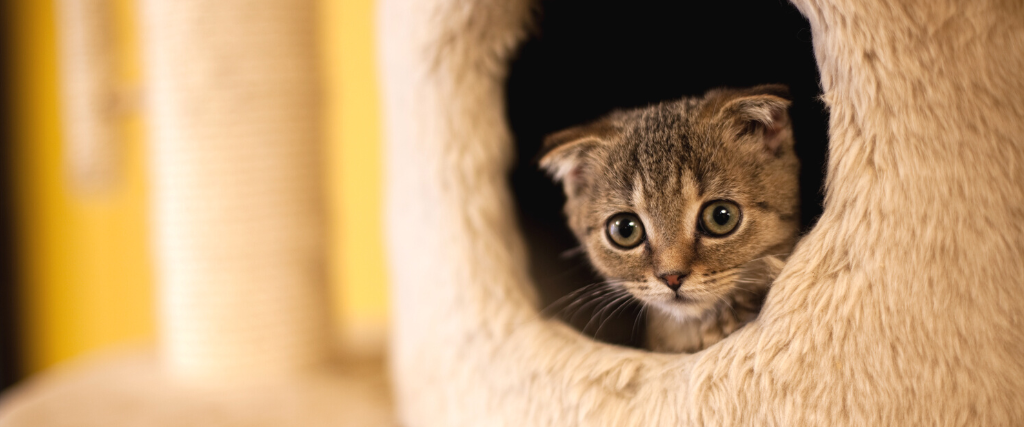Much like people, cats have individual personalities. Some love spending time with people, and others would prefer hanging out in their favorite hiding spot when you have guests over. Sharing your home with a shy or introverted cat can be tricky if you are someone with an active social life. You don't want to stress your favorite feline out, but you also don't want to avoid hosting gatherings in your home.
The good news?
You can have people over without putting your four-legged family member through too much stress. As veterinarians, we're here to share some tips on how to help your introverted cat when you have guests over. Keep reading to learn more.
Consider Why Your Cat Might Not Enjoy Guests
Most cats are creatures of habit. They enjoy routine, so they don't usually appreciate disruptions to their typical schedule. When suddenly faced with new sights, sounds, smells and people, they often become stressed. Even disruptions you may find pleasant can be frightening to a cat who doesn't understand what's going on. Loud knocking, boisterous greetings and even the sound of a doorbell can all trigger fear.
Socialization-or lack thereof-plays a big role, too. If your cat has never spent time around people who aren't in your immediate family, it's only natural that new people will stress them out. Your cat may also shy away from babies, young children, wheelchair users and any other type of person with which they are unfamiliar. Cats who are only around women most of the time may fear men, too, and vice versa.
Understanding why your cat doesn't enjoy houseguests is an important first step in helping them overcome their anxiety about people visiting your home. With this in mind, consider these tips for making visitors less stressful for your furry friend.

1. Practice Socialization
It's best to socialize your cat when they are young, but that doesn't mean you can't work on socialization later in life. If your cat goes running whenever someone arrives at your home, try teaching them that the arrival of guests is a positive thing. It may take several sessions, but the goal is to teach your cat to associate unfamiliar people with treats and affection.
First, set up a safe area. This could be a closet or a small room away from the main area of your home. Make the room nice and cozy by providing a bed, litter box and water. Introduce your cat to the room gently, and calm them by petting them and speaking in a soft voice. Give them some time to get used to the area.
Then, ask a friend (one with whom your cat is unfamiliar) to stop by. Have them enter your home and distance themself from you and your cat. If your cat remains calm, reward them with treats and affection. If not, leave them be. Do not force interaction. If they seem extremely stressed, end the session immediately.
In future sessions, try shaking a bag of treats to entice your cat to come closer to you. Ask your friend to move a bit closer with each session. Eventually, see if your cat will accept treats or affection from them. Your cat may never decide to be BFFs with your houseguests, but with patience, you should be able to teach them that having visitors in your home is a positive experience, not a negative one.
2. Confine Your Cat in a Comfortable Place
If you have tried socializing your cat to no avail, confining them to a comfortable place when you have guests over is the next best option. Your cat may already have a favorite place to hide when feeling stressed. If you can confine them to this area when you have guests, that's perfect. Otherwise, you may need to create a safe place. Follow the general guidelines above, and consider playing soft music to help drown out the sound of guests. Dim the lights, and make sure the area will remain at a comfortable temperature.
Confine your cat to this safe area prior to your guests' arrival. Don't wait until they are already stressed out about the arrival of new people! Once everyone has settled in, consider opening the door a crack, so your cat can come out if they choose to do so. Do not let your guests-especially kids-enter the area to bother your cat. If your cat comes out, that's great. But no one should enter their safe haven.

3. Try a Pheromone Diffuser
Pheromone diffusers help introverted cats feel more at ease. In fact, research has proven that cat-calming pheromone diffusers, like Feliway, reduce anxiety-related behaviors.
Using a pheromone diffuser can reduce behaviors like:
- Litter box avoidance
- Withdrawal and hiding
- Excessive vocalization
- Spraying
- Aggressive or destructive behavior
Simply plug one in, and it will diffuse synthetic or natural pheromones throughout your home 24/7. These soothing pheromones either mimic cats' facial pheromones or the pheromones a mother cat produces to soothe her kittens. In many homes, they are a perfect solution for keeping skittish cats calm when guests are over.
4. Practice Common Sense When Planning Activities
Keep your cat in mind when planning the activities for your next gathering. If you know they tend to be fearful when guests are around, don't plan things that will only increase their anxiety. Skip the party poppers, Christmas crackers and noisemakers. When a raucous event is a must, be considerate of your feline family member and plan the event at someone else's house.
Closing Thoughts
Having an introverted cat can be tricky when you are a social butterfly. However, you do not have to give up your active social life in order to keep your feline friend stress-free. Try the suggestions above. If they don't work, consult with your cat's veterinarian or a behaviorist to learn how you can better soothe their fear. Give us a call if your four-legged family member needs a veterinarian. We'd be more than happy to help!
